
|
|
Migi & Dali
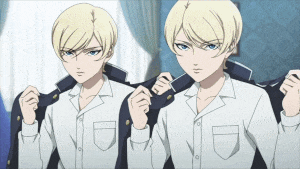 Twins at their Peak. A real hidden gem of 2023, Migi & Dali is a short anime series that really stands out from the pack for a variety of reasons. I had initially decided to save this one for later while recovering from an extreme glut of ongoing shows I wanted to keep up with during the summer season, but a friend of mine started watching it and strongly encouraged me to join them so we could gush over the show together every week. So big thanks to Z for making this review happen, love ya!
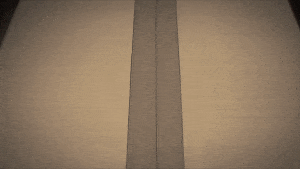 They mask it well underneath those innocent "perfect child" faces, but these two exude big Thing 1 and Thing 2 energy. Set in the late 1980s, Migi & Dali is the story of two orphaned twins with uncanny, almost superhuman abilities to mimic each other and switch places right under people's noses. When a nice elderly couple stops by the orphanage looking to adopt a child, the titular twins - appearing only one at a time - manage to win over the couple's hearts by playing the part of the perfect child. Since they can only adopt one child, Migi and Dali decide to use their specially-honed stealth tactics to live their lives as one person (the aptly-named "Hitori"), and accept the role of adopted child, thus completing Phase One of their master plan... ...that is, gaining a base of operations in this cozy little sequestered village and making connections with the locals so they can finally begin solving the mystery of their birth mother's murder.
 This scene from the opening told me everything I needed to know about the show while also leaving me with new, more alarming questions. The show sets an early precedent for eerieness and tension by focusing on Migi and Dali's creepy twin tendencies, showcasing their impossibly coordinated abilities, and their extreme suspicion of everyone around them. Despite the odds, they always manage to keep their dual personage a secret, and we slowly learn that they're not the only ones around here keeping weird secrets. Something is deeply awry in this sleepy little nowhere village, and the more the twins try to investigate its people for clues, the more its hidden horrors unfurl. Naturally, there are some false alarms and comedic backfires, but the show expertly walks a razor's edge between campy comedy and something genuinely unnerving, right up to a rather shocking climax.
 Remind me to make an AMV pairing Migi & Dali with Rockwell's "Somebody's Watching Me" some day. There are two main factors that lend themselves to Migi & Dali's excellent approach to dark comedy. One is the soundtrack, which uses a lot of haunting boys' choir and dissonant piano to really ramp up the atmosphere. The twins' main theme in particular sounds like a demented christmas carol that's extremely easy to get stuck in your head, and works beautifully during the more unsettling moments.
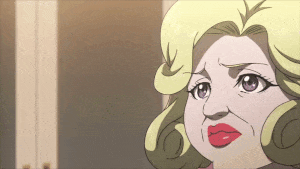 Given this anime is set in the late 1980s, about the time when Steve Jobs started making his first comeback, it's era-appropriate AND hilarious. The other thing that works to Migi & Dali's advantage is - strangely enough - a major weakness in most other modern anime. Now, this is less a complaint about modern shows and more about the current state of production, but a lot of modern anime suffers from how abysmal the working conditions have become for many studios. Animators are typically overworked and underpaid, budgets are extremely limited, and schedules are kept unreasonably tight in order to keep the production machine moving. With all these troubling factors at play, you can see cracks forming in the shows themselves. Anime, already known for its stylistic use of slow static pan shots and flappy fish-mouths for spoken dialogue, has another tool in its belt of animation-saving techniques that I've been noticing a lot lately. Much like old indie Flash animations, modern shows will sometimes make use of simply rotating or "waggling" limbs instead of piecing together a full movement. It's a smart technique in terms of saving time and the cost of drawing additional frames, but it comes at the expense of characters making jerky, puppet-like movements that ultimately look pretty shoddy.
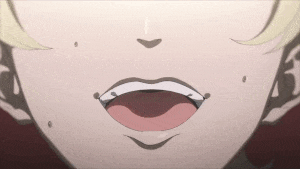 This is exactly how I used to laugh at my old manager's shitty jokes during company parties. That said, this type of janky limited animation actually kind of works to Migi & Dali's favor by adding to its already unsettling vibe. Characters making abrupt, wooden movements almost reflects the nature of the fake lives these people try to live while hiding their darkest secrets, and added a lot to the dark comedy aspect of the show for me. It also underscores what a difference even a tiny bit of animation can do to enhance or alter the feeling of the original manga. Little nuances like that are one of many things I love about watching animation, to be honest! (Not that it's a worthwhile trade-off for how it got that way, of course).
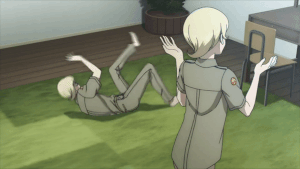 The only acceptable way to depict "rofl". One thing I wish I had a better description for is the show's tone. I keep calling it a dark comedy, but it's really tough to pin down exactly where along the sliding scale to place it. The show contains some genuinely shocking horror moments, and the comedy varies from campy and over-the-top to more ironic and detached. At times I'd almost put it in the same "misfit kids facing real danger" camp as The Goonies, but Migi & Dali has a flair for the surreal that feels more akin to maybe Twin Peaks, or one of the sillier episodes of Hell Girl. And at a brisk 13 episodes in length, it stays pretty tightly focused on slowly but surely drawing the story out of its eccentric characters at just the right speed. There's a genuinity to it that's hard to correlate but extremely satisfying to watch.
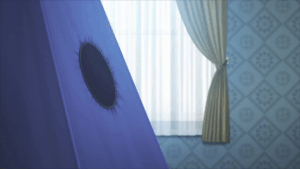 Undecided, undefined, undisturbed, yet undermined... On a final, much sadder note, Nami Sano - the artist and writer of the original manga for Migi & Dali - passed away only two months before the anime aired, at the very young age of 36. The anime ends with a nice little dedication to her that promptly brought a tear to my eye. I wish the industry wasn't such a clusterfuck sometimes, but there's still heart and soul there, and that makes me happy. Fuck cancer, man.
|
|